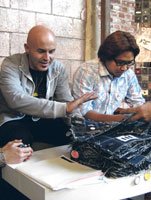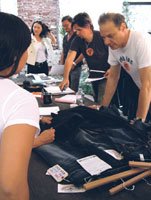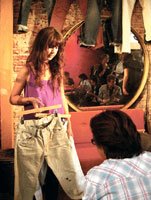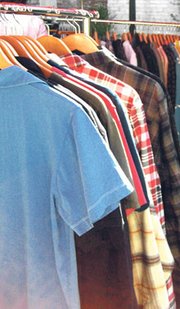Kingpins Expands Resources in L.A.
Kingpins, the New York–based denim sourcing showproduced by Olah Inc., returned to Los Angeles Sept. 10–11 with an expanded exhibitor roster.
For the first time, Kingpins’ producers invited denim mills Cone Denim, UCO and Tejidos Royo—competitors of Olahclient and Kingpins regular Kurabo Denim—to participate in the twice-yearly West Coast show. In all, 14 exhibitors packed the show, Kingpins’ largest so far in Los Angeles. Exhibitors included trim resources, overseas manufacturers of knits and wovens, embroidery and decorative trims resources, and representatives from specialty cotton and stretch-fiber manufacturers. The invitation-only show drew representatives from 37 companies, according to organizers. Designers and sourcing executives from brands such as Monarchy, GoldSign, Volcom, Juicy Couture, Quiksilver, Farmer Jeans, MEK, AC Collection, 7 For All Mankind, Guess? Inc. and Red Engine Jeans walked the show.
UCO, the established Belgian denim mill that has begun using the name Union Cottoniere in the United States, used its debut at Kingpins to reinforce its repositioning. “All brands become stale from time to time,” said Carrie Eddmenson, who represented the denim mill at the show. UCO, one of the originators of stretch denim, lost market share as other mills innovated on the stretchdenim concept. Now Union Cottoniere is making a name for itself with a domestic mill in North Carolina and a new focus on specialty denim. “We’re in a re-branding mode. We’re working on perfecting a stretch denim, but we’re also becoming known for our 100 percent cotton denim,” Eddmenson said. “Kingpins is the perfect place for us right now. We’ve had the opportunity to meet with important brands and do hourlong focused presentations. That’s very valuable to us.”
Tejidos Royo, a Spanish mill specializing in premium denim and non-denim PFD fabrics, brought its coated denim to Kingpins. Raul Bermell, Royo’s area sales manager who opened the mill’s Los Angeles office one year ago, said the show was a good opportunity to meet with existing clients as well as potential new accounts. Royo counts brands such as 7 For All Mankind, BCBG, Guess, Hudson, Union and Robin’s Jeans among its clients.
Cone Denim showed new fabrics it developed using the XLA stretchfiber developed by Dow Fiber Solutions, another Kingpins exhibitor, as well as the T400 stretch fiber and S Gene yarn technology, which makes for strong, lightweight denim. “Stretch is very important,” said Kara Nicholas, Cone’s vice president of new product and marketing, adding that the menswear denim market is significantly increasing its consumption of stretch denim.
Kurabo continued to produce denim with XLA stretch fiber, with approximately 75 percent of its new offerings at Kingpins featuring the fiber. The mill, which produces denim in Hong Kong and Japan, featured lightweight denim that could withstand the abrasions and distressing that are coming back into vogue. Another popular specialty Kurabo denim is “Crunch,” a wide denim with the look and feel of selvage denim. Typically produced on vintage 28-inch looms, selvage can be price-prohibitive. Crunch is produced in China on 58-inch looms in 14-ounce and 11.5-ounce weights.
“The idea of including competing mills is to make Kingpins a better experience and even more valuable to our customers,” said Andrew Olah, Olah’s chief executive and Kingpins cofounder. Another change attendees could appreciate is the show’s new dates. Originally an October show, Olah and his team pushed Kingpins up a full month to allow designers an earlier peek at exhibitors’ Fall 2009 offerings. “The October dates were too late for some brands [for Fall],” Olah said.
Brad Mowry, Olah’s managing director of West Coast operations, echoed Olah’s emphasis on customer service. “First and foremost, Kingpins is a premium supply-chain show. We are always looking to expand our range. Our exhibitors are laundries, fiber suppliers, chemical companies, hardware and accessories suppliers, embroiderers, thread and yarn companies, and garment manufacturers.” Come March, he said, Kingpins will most likely have a new, larger location and more exhibitors.
Gary You, a partner at Another Design Studio, a denimfocused design and production consulting firm, shopped Kingpins for resources and inspiration for his customers. At the top of his list were hardware resources. “I tell my clients that the quickest way to add value to jeans—especially in this sort of economic climate—is with hardware. It is subtle, but it can change the entire look and feel of a garment,” he said.
Argentina-based hardware maker Apholos reported growing interest among brands for custom hardware and hardware that complements distressed and aged-looking jeans. Shiny, perfect rivets, zippers and buttons are out, said Franck Noel and Luciana Botner of Apholos. Instead, oxidized metals, chipped enamel and hardware that looks like it has lived several lifetimes proved to be key buys for premium-denim brands.

























